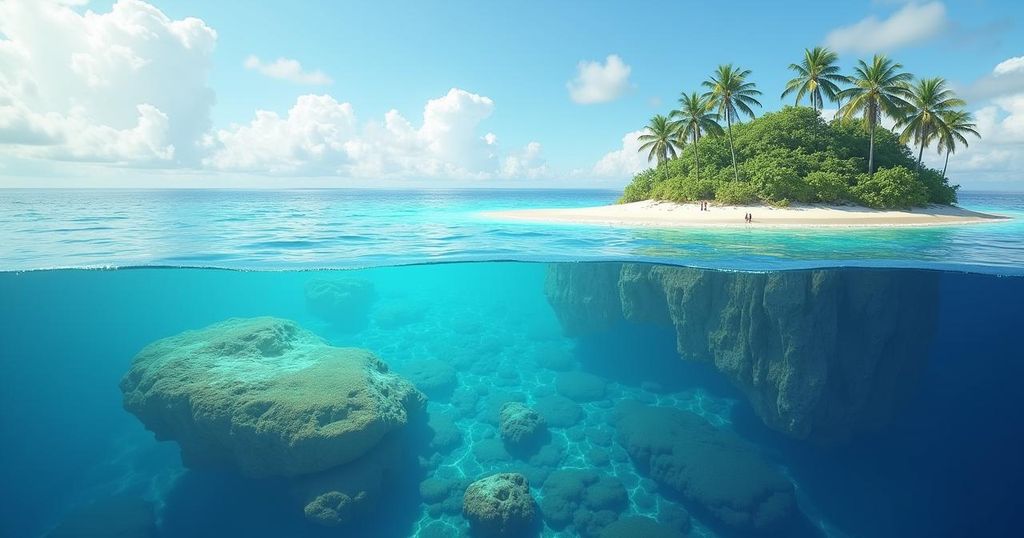U.N. Secretary-General Antonio Guterres emphasized the urgency of rising sea levels threatening Pacific island nations during his visit to Tonga. Reports indicate that these levels have risen significantly in areas like Nuku’alofa, dramatically increasing the frequency of coastal flooding. Guterres calls for immediate action from wealthier nations to mitigate emissions and support vulnerable regions, urging Pacific nations to leverage their moral authority at the upcoming U.N. General Assembly.
In a critical address concerning the escalating threat of rising sea levels, U.N. Secretary-General Antonio Guterres issued a stark warning regarding the peril faced by Pacific island nations. He emphasized the urgency of the situation, coining an impromptu climate message with the acronym “SOS” standing for “save our seas.” Recent reports from the United Nations and the World Meteorological Organization detail how rising sea levels, compounded by climate change, are disproportionately impacting the Southwestern Pacific region. Guterres made these remarks during his visit to Tonga, amidst a gathering of the Pacific Islands Forum, where he underscored the dire consequences of climate change, including ocean acidification and heat waves alongside the rising sea levels. During his address, Guterres illustrated the stark reality that sea levels around Nuku’alofa, Tonga, have risen by 21 centimeters (8.3 inches) since 1990, which is significantly above the global average of 10 centimeters (3.9 inches). He further noted the alarming trend of increased coastal flooding in various Pacific locations; for instance, Guam has experienced flooding incidents that have surged from twice yearly in 1980 to 22 times in recent years. Notably, American Samoa has seen flooding incidents escalate from none to 102 times annually. Guterres highlighted that approximately 90% of individuals in the Pacific region live within a mere 5 kilometers of rising sea levels, placing them at elevated risk. Celeste Saulo, the secretary-general of the World Meteorological Organization, shared insights on the transformation of oceans from a dependable ally to an imminent threat due to rising seas. The reports indicate that parts of the western tropical Pacific are experiencing sea level increases almost twice the global average, resulting from a combination of melting ice in Antarctica and Greenland and thermal expansion attributed to water temperature increases. During the event, Guterres recognized the urgent need for affluent nations to pivot their climate strategies, aiming to lessen carbon emissions and support vulnerable countries. He anticipates that the Pacific island nations will express their concerns powerfully at the upcoming United Nations General Assembly, emphasizing their unique moral authority as they contribute minimally to the greenhouse gases responsible for climate change.
The increasing global challenge of rising sea levels is chiefly driven by climate change, particularly the warming of the planet and the resultant melting of glacial ice. The Pacific island nations are among the most vulnerable populations affected by these changes, which encompass worsening conditions such as food and water shortages, increased flooding, and habitat destruction. This region, despite its minimal contribution to global emissions, faces the detrimental effects of climate change more acutely compared to other parts of the world. This disconnect underscores a broader issue of environmental justice, suggesting that those least responsible for climate change often suffer the most severe consequences.
In conclusion, the rising threat of sea levels represents a severe crisis for Pacific island nations, with U.N. Secretary-General Antonio Guterres articulating the urgency of this situation. The islands face substantial risks not only from rising waters but also from the associated effects of climate change, including coastal flooding and environmental degradation. The need for immediate and effective action from developed countries is paramount, as the voices of the Pacific island nations are crucial in the global climate conversation leading up to the next United Nations General Assembly.
Original Source: www.voanews.com






